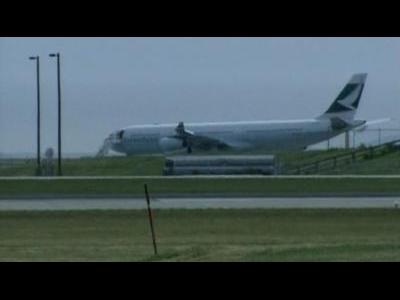LONDON – Two of Europe's busiest airports closed early Monday morning as a dense cloud of volcanic ash drifted from Iceland, aviation authorities said.
The airspace over London's Heathrow Airport closed at 1 a.m. local time Monday (0000 GMT; 8 p.m. EDT), Britain's National Air Traffic Service said in a statement late Sunday night.
In Amsterdam, Schiphol Airport, another of Europe's biggest air travel hubs, was closed until 2 p.m. local time Monday, a statement on Dutch airline KLM's website said.
The restrictions affecting Heathrow — as well as Gatwick, Stanstedand London City airports — will be in place until at least 7 a.m. local time (0600 GMT) Monday, the aviation authority said.
Airports across Britain and Ireland were closed for much of Sunday because of the drifting ash. The shifting of the no-fly zone southward will allow airports in northern England — including the key cities ofManchester and Liverpool — to reopen after 1 a.m. local time.
But all airports in Northern Ireland, as well as some Scottish facilities, will remain shut.
In Ireland, Dublin's international airport closed early Sunday evening until at least 12 p.m. Monday (1100 GMT, 7 a.m. EDT). Some airports in Ireland's west were closed and will reopen at different times Monday, but Shannon and southern Cork were open "until further notice."
The British air traffic agency said the ash cloud was changing shape and moving south, toward Oxford, England, 60 miles (100 kilometers) northwest of London. Britain's weather service says the northwest winds should shift midweek, redirecting the ash away from Britain.
German authorities sent up two test flights Sunday to measure the ash cloud, one from the German Aerospace Center (DLR) and the other from Lufthansa, the country's biggest airline.
The DLR plane flew to southern England then continued north, collecting data from between 10,000 to 23,000 feet (3,000 to 7,000 meters). The Lufthansa Airbus A340-600, equipped with special scientific gear, left Frankfurt to fly over northern Germany, the United Kingdom and parts of Scandinavia.
All the data from both flights was immediately sent to aviation authorities in the U.K, the Netherlands and Germany, said aerospace center spokesman Andreas Schuetz.
Ash can clog jet engines. The April 14 eruption at Iceland's Eyjafjallajokul volcano forced most countries in northern Europe to shut their airspace between April 15-20, grounding more than 100,000 flights and an estimated 10 million travelers worldwide. The shutdown cost airlines more than $2 billion.
In southern Iceland, activity at the volcano fluctuated Sunday but did not get more intense, civil protection official Agust Gunnar Gylfason said. He blamed the closures on shifting winds.
"What really changes the situation is the weather pattern," he said.
The Icelandic weather service said "presently there are no indications that the eruption is about to end."
Airlines complained bitterly over the air space closures last month, calling them an overreaction. The European air safety agency last week proposed drastically narrowing the continent's no-fly zone because ofvolcanic ash to 120 miles (190 kilometers) like the one used in the U.S. The proposal still must be approved.
Virgin Atlantic's president, Sir Richard Branson, criticized British authorities for Sunday's no-fly zone. British Airways agreed, calling the approach "overly restrictive and not justified on safety grounds" and saying airlines are best qualified to determine whether it's safe to fly.
"The closing of Manchester airspace once again is beyond a joke," Branson said in a statement. He said test flights have "shown no evidence that airlines could not continue to fly completely safely."
A spokesman for Britain's Civil Aviation Authority called Branson's remarks "surprising" because airline representatives and engine manufacturers last week had agreed to find a way to ensure planes could fly safely in the volcanic ash.
"We as an organization can't just say, 'Oh, I'm sure it's all right, go fly without evidence it's safe,'" Jonathan Nicholson said.
British Airways, facing cabin crew strikes beginning Tuesday, said it had canceled a small number of flights out of Manchester. The airline's chief executive, Willie Walsh, is to meet with British Transport Secretary Philip Hammond on Monday.
Eurostar, which runs trains between Britain and continental Europe, said it was adding four extra trains — an additional 3,500 seats — between London and Paris on Monday.
Eyjafjallajokul (pronounced ay-yah-FYAH-lah-yer-kuhl) erupted in April for the first time in nearly two centuries. During its last eruption, starting in 1821, its emissions rumbled on for two years.
__
Associated Press writer Juergen Baetz contributed to this story from Berlin.
http://news.yahoo.com/s/ap/20100517/ap_on_bi_ge/eu_iceland_volcano



Tidak ada komentar:
Posting Komentar